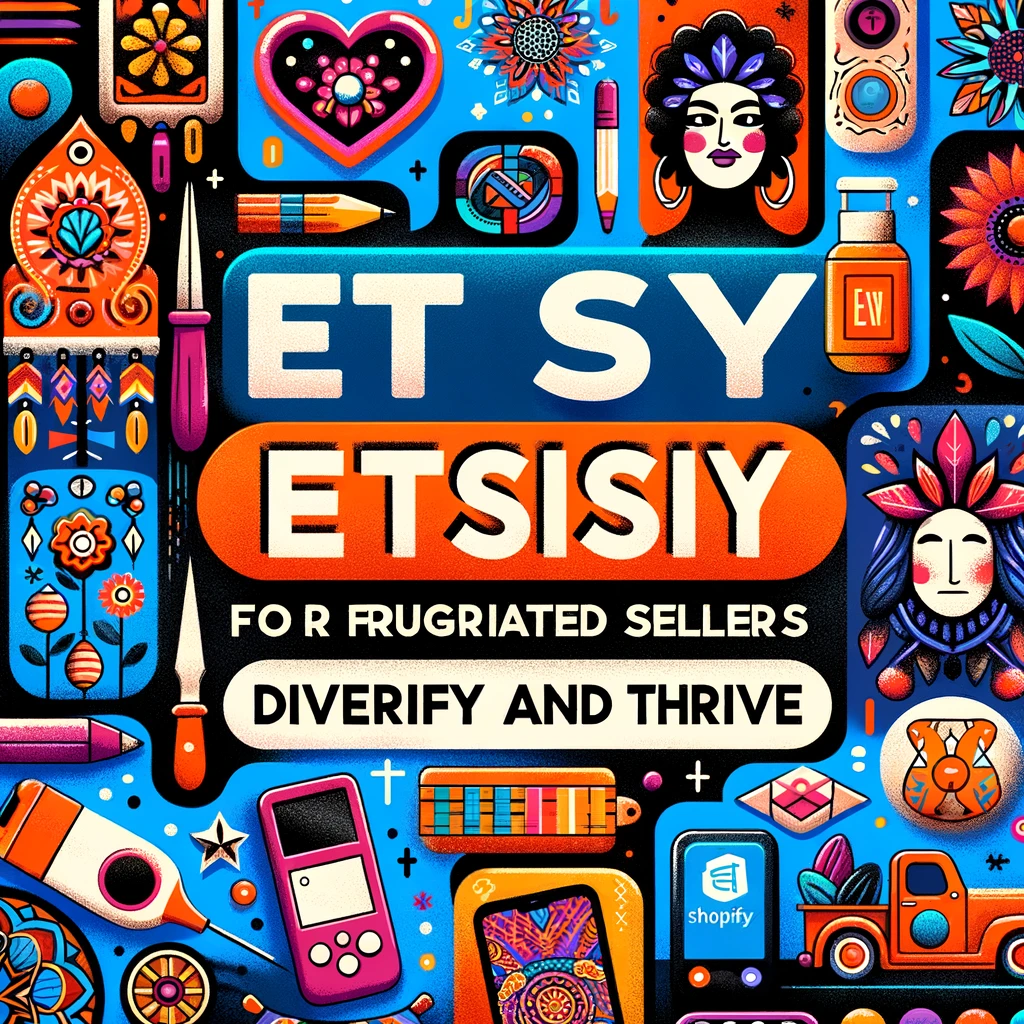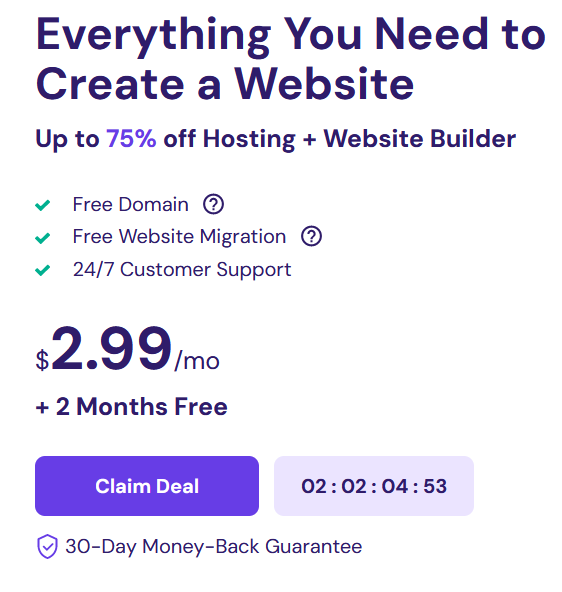Are you tired of Etsy’s increasing fees, sudden policy shifts, and the constant threat of losing your business overnight?
You’re not alone. Many sellers are seeking more reliable, supportive platforms to showcase their creativity and boost their sales. Let’s explore the top 17 Etsy alternatives that can help solve these common pain points and provide better opportunities for growth.
Imagine your funds frozen, shops closed, and revenue lost due to a platform’s arbitrary decisions. Every marketplace carries inherent risks, and relying solely on one can jeopardize your livelihood. It’s crucial to use these platforms to raise awareness and direct traffic to your own website, where you have full control. Hostinger makes this easy with AI-powered tools to create the perfect website in minutes. Start building your independent e-commerce empire today and claim a 75% off deal with Hostinger!
1. Amazon Handmade
The Perfect Solution for Reaching a Massive Audience
Many Etsy sellers feel overwhelmed by the platform’s fees and policies. Amazon Handmade offers a vast customer base and the credibility of Amazon, making it a powerful alternative.
Why It’s Better:
- Huge Customer Base: Access millions of Amazon shoppers.
- Reliable Fulfillment: Use Fulfillment by Amazon (FBA) for hassle-free shipping and customer service.
- Trust Factor: Benefit from Amazon’s established reputation.
Cons:
- They own You. They will steal your idea and underbid you until you go out of business
- Higher Fees: Amazon’s fees can be higher, but the trade-off is a broader audience.
- Little to no insight into customers.
2. eBay
Flexibility and Global Reach
eBay’s diverse marketplace is a great alternative for sellers tired of Etsy’s niche limitations. It offers auction-style and fixed-price listings, catering to a wide variety of products.
Why It’s Better:
- Well known and established Etsy alternative
- You get access to customer email to build list
- Versatility: Sell anything from handmade crafts to vintage goods.
- Global Market: Reach buyers from all over the world.
- Lower Fees: Generally lower fees compared to Etsy.
Cons:
- High Competition: Similar to Etsy, but with the potential for a larger audience.
3. Shopify
Full Control Over Your Store
If Etsy’s restrictions are stifling your creativity, Shopify allows you to create a fully customizable online store, giving you complete control over your brand.
Why It’s Better:
- Customization: Fully customizable storefront.
- Scalability: Supports businesses of all sizes.
- Extensive Tools: Access to a wide range of apps and integrations.
Cons:
- Monthly Fees: Shopify has a monthly subscription fee, but it offers extensive features and flexibility.
4. Big Cartel
Affordable for Artists and Makers
Big Cartel is designed for independent artists and makers who may feel overshadowed on Etsy. It offers affordable plans and a straightforward platform.
Why It’s Better:
- Low Cost: Affordable plans, including a free tier.
- Artist-Friendly: Designed with artists in mind.
- Easy Setup: Simple and intuitive setup process.
Cons:
- Limited Features: Not as feature-rich as Shopify, but perfect for smaller stores.
5. Zibbet
Multi-Channel Selling Made Easy
For sellers frustrated with Etsy’s ever-changing policies, Zibbet offers a multi-channel management tool that allows you to list products on various platforms, including Etsy itself.
Why It’s Better:
- Multi-Channel Management: Sync your inventory across multiple platforms.
- User-Friendly: Easy to use and manage.
- Cost-Effective: Only pay for the sales channels you use.
Cons:
- Smaller Audience: Not as large as Etsy or Amazon, but great for diversifying sales channels.
6. ArtFire
Community-Oriented Marketplace
ArtFire offers a supportive community for sellers who feel lost in the crowd on Etsy. It focuses on handmade, vintage, and craft supplies.
Why It’s Better:
- Lower Fees: More affordable than Etsy.
- Community Support: Strong focus on supporting small businesses.
- Specialized Niche: Great for crafters and artisans.
Cons:
- Smaller Customer Base: Less traffic than Etsy, but more focused buyers.
7. Bonanza
Easy Integration and Low Fees
Bonanza is ideal for sellers looking for an easy-to-use platform with lower fees. It integrates well with other marketplaces, making it easy to manage your sales.
Why It’s Better:
- Low Fees: More affordable than many competitors.
- SEO Friendly: Good integration with Google Shopping.
- Easy Setup: User-friendly platform.
Cons:
- Smaller Market: Not as well-known as Etsy or Amazon, but growing steadily.
8. Storenvy
Social Marketplace with Customizable Stores
Storenvy combines a marketplace with customizable store features, offering sellers the best of both worlds. It’s perfect for those who want to create a unique brand identity.
Why It’s Better:
- Free Listings: No upfront listing fees.
- Customizable Stores: Build your brand with customizable storefronts.
- Social Features: Leverage the social marketplace to attract buyers.
Cons:
- Limited Support: Customer support can be less responsive compared to larger platforms.
9. Aftcra
Supporting American Artisans
Aftcra is dedicated to American-made crafts, providing a platform for sellers who want to emphasize their local craftsmanship.
Why It’s Better:
- Focus on Local: Exclusively for American artisans.
- Low Fees: Affordable pricing structure.
- Curated Marketplace: Buyers looking specifically for American-made goods.
Cons:
- Limited to USA: Only for US-based sellers and buyers.
10. Cratejoy
Ideal for Subscription Box Businesses
Cratejoy specializes in subscription boxes, offering tools and support for sellers who want to create recurring revenue streams.
Why It’s Better:
- Niche Market: Perfect for subscription-based businesses.
- Support Tools: Comprehensive tools for managing subscriptions.
- Marketing Assistance: Helps with promotion and customer acquisition.
Cons:
- Subscription Model: Only suitable for businesses focused on subscription boxes.
11. Folksy
The British Etsy Alternative
Folksy is a UK-based marketplace focused on British handmade crafts. It’s ideal for sellers who want to reach a UK audience.
Why It’s Better:
- Local Focus: Dedicated to British artisans.
- Community Support: Strong, supportive seller community.
- Affordable Fees: Lower fees compared to Etsy.
Cons:
- Geographic Limitation: Primarily caters to UK-based sellers and buyers.
12. iCraft
For Truly Handmade Products
iCraft emphasizes handmade products and has strict guidelines to ensure authenticity, making it a great alternative for sellers frustrated by Etsy’s more lenient policies on reselling.
Why It’s Better:
- Handmade Only: Strictly for handmade products, ensuring authenticity.
- Low Fees: Affordable listing and commission fees.
- Niche Market: Focused on handmade goods only.
Cons:
- Smaller Market: Less traffic than Etsy, but highly targeted audience.
13. Tictail (Acquired by Shopify)
Easy to Use and Customizable
Tictail was known for its user-friendly interface and customization options. Now integrated with Shopify, it offers the best of both worlds.
Why It’s Better:
- Customizable Stores: Easy to create and customize your store.
- Integration with Shopify: Benefit from Shopify’s powerful features.
- User-Friendly: Intuitive platform for new sellers.
Cons:
- Transition: Some sellers may need to adjust to Shopify’s more extensive features.
14. Madeit
The Australian Handmade Marketplace
Madeit is Australia’s premier online marketplace for handmade goods, perfect for sellers looking to reach Australian buyers.
Why It’s Better:
- Local Focus: Dedicated to Australian artisans.
- Supportive Community: Strong focus on community and support.
- Affordable Fees: Competitive fees compared to Etsy.
Cons:
- Geographic Limitation: Primarily for Australian sellers and buyers.
15. Depop
For Trendy and Unique Items
Depop is a mobile marketplace focused on trendy, unique, and vintage items, making it ideal for sellers targeting a younger demographic.
Why It’s Better:
- Mobile-First: Designed for mobile users, attracting a younger audience.
- Trendy Marketplace: Perfect for selling fashion, vintage, and unique items.
- Social Features: Integrated social media features for better engagement.
Cons:
- Niche Audience: Best for fashion and vintage items.
16. RebelsMarket
For Alternative Fashion and Accessories
RebelsMarket is a niche marketplace for alternative fashion, accessories, and home decor. It’s perfect for sellers with edgy, unique products.
Why It’s Better:
- Niche Focus: Dedicated to alternative fashion and accessories.
- Engaged Community: Buyers specifically looking for unique and edgy items.
- Global Reach: International audience.
Cons:
- Niche Market: Best suited for sellers with alternative products.
[Sell on RebelsMarket](https




Comments are closed